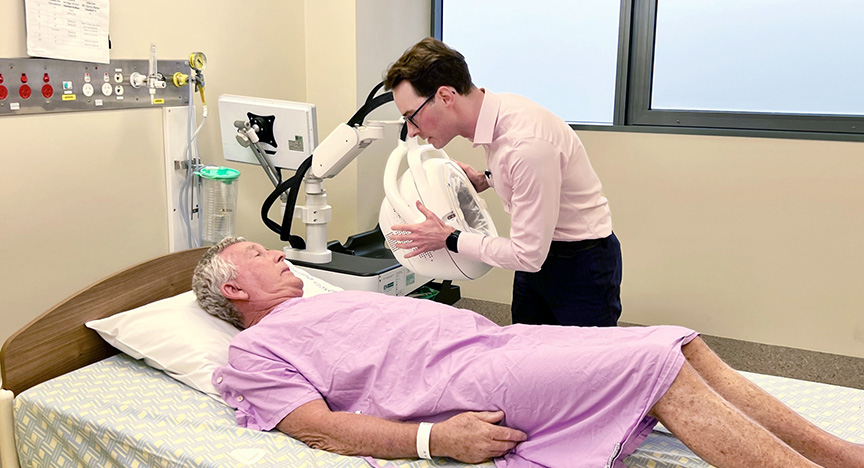
Adapted with permission from ABC Brisbane
A world-first brain scanner trialled at Princess Alexandra Hospital since 2019 which allows clinicians to perform a brain scan at the patient bedside in under 30 seconds is now revolutionising stroke diagnoses within the golden hour.
The successful trial and refinement of the portable brain scanner has led to the scanners being trialled in ambulances in 2024.
This is significant news for people in rural areas who suffer a stroke, as they are impacted by distance and time to make a diagnosis with data showing they have only three per cent chance of being diagnosed within the first hour.
PA Hospital Staff Specialist in Neurology, Dr Michael Devlin said the Australian data shows that people in rural and remote regions also have more stroke disability on average than people with stroke from metropolitan regions so it is hoped the portable brain-scanner "helmet" could close that city-country divide.
"The longer delays to treatment for people with a stroke in the bush means there is more damage to the brain before blood vessel blockages can be reopened,” Dr Devlin said.
“The portability of this device might allow for stroke diagnosis and treatment in your driveway when paramedics arrive, or rural hospital that doesn’t have a CT scanner.”
He said there has been a lot of interest in the device being trialled at PA from patients and staff curious about the new technology but that every stroke patient and their family has been happy to be involved when approached to discuss the trial.
The lightweight scanner was developed by medical imaging company EM Vision using research by the University of Queensland.
EM Vision's Scott Kirkland said the technology would allow paramedics to run a scan and send the images to specialists, meaning patients could be diagnosed on the road.
"It is a road and air ambulance model, a first responder model, designed to bring imaging to the patient no matter where they are," Mr Kirkland said.
"We know there is a huge inequality in stroke care outcomes in rural and regional areas.
"As many live many kilometres away from major hospitals, this high-end imaging will open the door to earlier treatment and better outcomes."
Colin Knot, 75, from Shailer Park south of Brisbane has fully recovered since his stroke just over a month ago following a swift diagnosis within 60 minutes of his stroke beginning.
He was speaking to his wife when he stopped making sense.
"She kept saying, 'I don't understand what you are saying' and like most marriages, I presumed it was just the wife not understanding the husband," he said.
"In my head, I knew what I was saying, but she panicked and called an ambulance."
He was at Princess Alexandra Hospital within half an hour and in having his interventional clot removal procedure within an hour after that.
"I am very lucky," he said.